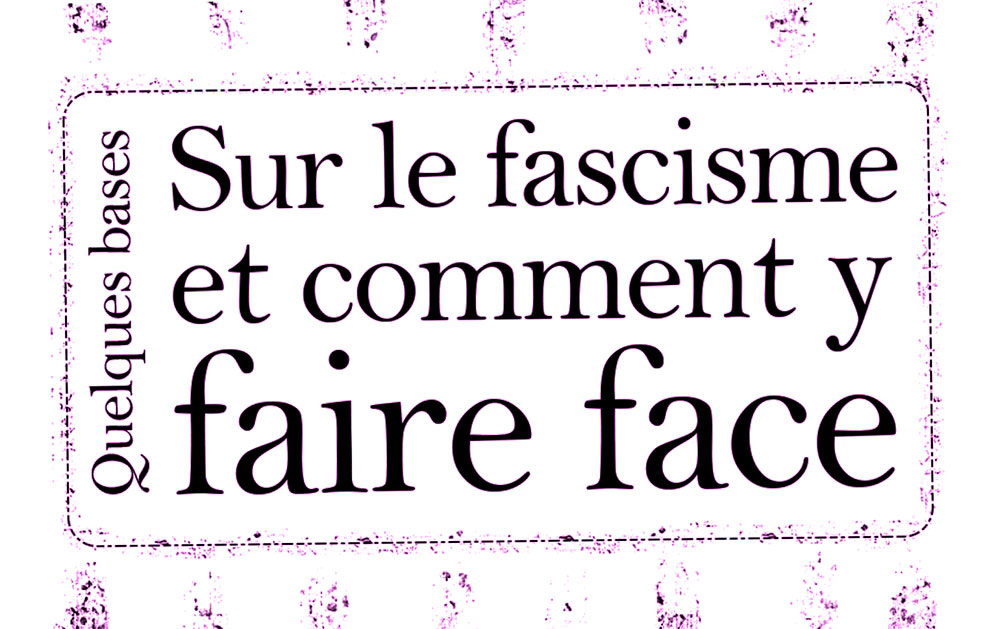Anonymous
May 2025, Bas-du-Fleuve
(reproduced with permission by Montréal Antifasciste)
[Version pdf – French /// Version pdf format livret – French]
We are witnessing the most documented genocide in history in Palestine and the consolidation of a fascist regime in the United States. Many of us are wondering what to do about it. Here’s a conceptual framework for understanding what’s going on and how we can respond. This synthesis draws upon material from Kelly Hayes and her Organizing My Thoughts blog, the thinking of Mariame Kaba and Andrea Ritchie of Interrupting Criminalization, Ejeris Dixon and his podcast Fascism Barometer, Scot Nakagawa’s The Anti-Authoritarian Playbook blog, Anne Archet’s blog flegmatique, the YouTube channel Thought Slime, and Mark Bray’s Antifa: The Anti-Fascist Handbook, among other sources.
///
Some Basics
Fascist movements, parties, and regimes can be recognized by:
- an authoritarian trajectory aimed at dismantling democratic structures, eliminating dissent, and maintaining their leader’s power.
- blatant lies that do not undermine their support.
- a propensity for instrumentalizing crises or creating them out of thin air to enrich themselves and to restrict civil liberties, including freedom of movement and assembly, the right to demonstrate, freedom of the press, and the right to a fair trial.
- idealized representations of race and nation, articulated in terms of purity, unity, and loyalty.
- a desire to dominate and/or eliminate marginalized groups (women, migrants, 2LGBTQIA+ people, Black people, Indigenous people, religious minorities, people with disabilities, the poor, autistic people, etc.) that takes the form of dehumanizing rhetoric and repeated attacks on their fundamental rights.
- a conviction that inequalities do not stem from social conditions but are natural and biological, and that this hierarchy is entirely legitimate.
- references to a fictional past where all of the above was allegedly the case.
- a fetishization of violence as the response to the humiliation of failing to entirely dominate marginalized groups.
- a dual objective of internal cleansing and external expansion.
Fascism can seize state power through elections, a coup d’état, or a combination of both, as in the case of the Trump administration, which won the election and used its ascension to power to carry out an “administrative coup”—the illegal usurpation of congressional power and various state department powers by Elon Musk and the DOGE.
Once in power, fascism uses a well-known operative approach: criminalization. It passes laws that make certain activities criminal and deploys the police, the justice system, and prisons against the people who engage in them. For example, it criminalizes:
- giving or receiving certain types of care (abortion, gender-affirming care, and possibly care for people with autism and people with disabilities. . .).
- providing information (by transforming the definition of pornography so that the laws sanction any book dealing with queerness, by transforming the definition of antisemitism to include any denunciation of the genocide of the Palestinian people, by arresting lawyers who give legal information to migrants. . .).
- simply existing on its territory (the mass revoking of visas, cancellation of status, criminalization of the homeless. . .).
Beyond laws, criminalization is politicized to designate entire groups of people as threats:
- trans and intersex women are a threat to cis women in sports and more generally.
- demonstrators are a threat to the rest of society.
- migrants undermine job security and the housing market and threaten the working class.
- Muslims threaten national security.
These threats are nurtured by fascist narratives and presented as existential threats to the nation’s future, thereby:
- dehumanizing targeted groups.
- pre-emptively stripping them of their fundamental rights.
- portraying them as “others” who must be violently controlled, punished, and eliminated.
- using them as scapegoats for all the evils of capitalism and fascism.
It is through this process of criminalization that fascist regimes create popular consent for the violence deployed against certain groups (physical and psychological violence, disappearances, forced labor, denial of care, murder. . .). People are made to believe that:
- those targeted by hatred are not victims but are being punished for their crimes.
- violence is both justified and completely normal.
- those targeted would have been left in peace it they hadn’t committed a crime.
However, what is defined as a crime continuously grows.
This process also exists in so-called liberal democracies, which have developed expansive judicial and prison apparatuses. Fascists need the infrastructure and the legitimization that liberal democracies readily provide for the industrial-carceral system to function.
Keep in mind that:
- police and prisons are a legacy of slavery and colonization.
- Indigenous peoples in Canada have been the targets of genocidal violence.
- their dances, rituals, and languages were criminalized.
- they have suffered mass sterilization, forced displacement, and far-reaching abuse in residential schools.
Fascism is not so much a break with liberal democracies as a form its panic takes. As a result, the fascism currently consolidating in the United States and taking shape in Canada and Québec is characterized by:
- panic in the face of recent advances in social justice, which they call “wokeness,” and which threaten their domination.
- panic over the climate crisis and the efforts to mitigate it, both of which threaten access to the resources that underpin their dominance.
- a tense alliance of Christian fundamentalists, a racist and sexist grassroots movement, a political elite, and ultra-rich big tech oligarchs.
Here are a few other important facts about fascism:
- The fascists want us to waste our time. They will tell all sorts of lies so that we spend hours trying to prove our point, deconstructing their rhetoric, and clarifying facts. Then the next day they completely change their tune forcing us to do it all over again.
- For fascists, certain (mythical) truths are more important than reality. If reality doesn’t agree with their truth, reality is wrong. Their relationship to reality is substantially undermined, so reality won’t convince them that they’re wrong. Reality has no bearing on their truth.
- Above all, fascists want power. That’s what motivates them. They will adjust their rhetoric and values as much as is necessary to acquire and maintain power.
- Fascists want survival of the fittest, based on a cartoonish Darwinian vision of evolution. They want to dominate. As they see it, anything that keeps them in power is justified. Their domination proves them right, and that’s all they need.
- Fascism is not the work of a few outsiders hovering above the population. People participate, cooperate, and then become acculturated to fascism. It becomes their reality, their way of understanding the world.
How to Deal with Fascism
Historically, state apparatuses, opposition parties, the justice system, and the mainstream media have all failed to prevent the rise of fascist regimes. The neoliberal elites who run democracies may appear to oppose fascism, but faced with an increasingly unlivable world in which it becomes impossible to sustain both capitalism and liberal democracy, they too will adopt increasingly fascistic policies. For neoliberals, the criminalization and/or abandonment of ever-larger groups of marginalized people will be articulated as a matter of pragmatism and inevitability, while fascists will present it as the desirable return of a violently unequal natural order. In short, don’t expect the support of the neoliberal elites.
Popular organization is the best form of resistance. If the normalization of police, prisons, and mass surveillance has made this effort more difficult, there are, nonetheless, multiple avenues for collective resistance.
Where to start:
- Openly resist the consolidation of fascism. Clearly identify what is happening in the United States, Palestine, Canada, and elsewhere. Talk about fascism with those closest to you. Don’t let it be surreptitious. Force it out into the open.
- Act locally against events organized by fascist groups. Attack them in every possible way. Physically prevent them from spreading their hatred.
- Call bullshit what it is. Don’t get sidetracked by their lies. Don’t waste your time arguing with them. Don’t get caught up in their way of framing the situation. Bring the discussion back to what they do, to the horrors they commit, to the hatred that drives them.
- Above all, don’t immediately fall into line if fascists come to power. When faced with authoritarian power, people tend to anticipate what a repressive government would want, and immediately cooperate, to make sure they don’t anger those in power and to protect themselves. This anticipatory obedience tells the regime what compromises people are willing to make and enables it to go much further much faster. This way of adapting harms everyone. It’s essential not to reflexively obey.
- Maintain solidarity. Fascism normalizes human suffering and the jettisoning of groups of people designated as negligible or insignificant. Fascists want us to fall back upon our survival instinct, to get caught up in our personal preoccupations, to be isolated and weak. Solidarity is our strength.
We must build and maintain collective people’s power: the power to keep our communities safe; the power to prevent any of our own from being disappeared; the power to make sure everyone has food. We must begin by exploring all the ways in which we can participate in building this power, for example, by working to:
- block fascist advances (e.g., by fighting anything that increases the scope, capacity, resources, and power of the carceral state and fascist movements, such as building new prisons, militarizing borders, new identification systems targeting certain groups, etc.).
- break their alliances and links with local groups and organizations (e.g., links between workers’ unions and organizations representing the police, links between the police and far-right militias, links between the mass media and transphobic activists, etc.).
- minimize the impact of their policies (e.g., build and support a strong community network, self-help groups, secure communications networks, community defense infrastructures, gathering spaces, etc.).
- build bridges between the communities affected (e.g., trade unions, women’s groups, anarchist gangs, anti-colonial movements, abolitionists, disability rights activists, etc.).
- develop resources (e.g., organizations dedicated to sharing the history of struggle, transformative justice organizations, as many spaces as possible where we can gather, debate, digest all of the available information, have block parties, organize workshops, conferences, and marches, etc.).
To explore this issue further, I suggest the zine Block and Build: But Make It Abolitionist by the Interrupting Criminalization organization. Then it’s a matter of determining what makes sense for us, what we’re able to do, and how we understand our social context and the overall situation. For this, I recommend the zine Making a Plan, also an Interrupting Criminalization publication.
It could start with a union, a local chapter of Food not Bombs, a group that organizes people’s assemblies, a housing committee, a group of friends who make engaged art, a women’s group, and so on. All of it is relevant. these groups must:
- develop a common language and an overall assessment of the situation.
- coordinate in a decentralized way that encourages autonomous action as part of a larger whole.
- develop a security culture commensurate with the level of risk.
- prepare for repression by setting up a support system in advance.
Then, when the time comes, it will be possible to fight a fascist regime on a large scale thanks to:
- a large enough mass of people committed to noncooperation, people who forget to deliver a letter or to forward an e-mail, who slow down some construction project, who don’t remove books from the shelves, who continue teaching history to children, who sabotage bureaucratic processes, who give false information to the police, who continue making music outside and at night, all of it to disrupt the smooth functioning of the regime.
- diversity of tactics, including mass demonstrations, a general strike, industrial sabotage, alternative health care networks, etc.
If we join forces to fight fascism and the criminalization process that underpins it, anything is within our reach.




![[FAIL] The Time the Far Right Tried to Spread a Phony Denunciation of Sexual Assault](https://montreal-antifasciste.info/wp-content/uploads/2018/06/fail_fake-440x264.png)
